- Clone
- 3.2.3 (See other available formats)
- Regulatory Status
- RUO
- Other Names
- NKR-P1, CD161a/CD161b, NKR-P1a/KLRB1a
- Isotype
- Mouse IgG1, κ
- Ave. Rating
- Submit a Review
- Product Citations
- publications
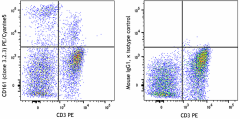
-

Rat splenocytes were stained with anti-rat CD3 PE and CD161 (clone 3.2.3) PE/Cyanine5 or mouse IgG1, κ PE/Cyanine5 isotype control (right).
| Cat # | Size | Price | Quantity Check Availability | Save | ||
|---|---|---|---|---|---|---|
| 205611 | 25 µg | $101 | ||||
| 205612 | 100 µg | $288 | ||||
CD161 is a 30 kD type II transmembrane C-type lectin, expressed as a homodimer. Rat NKR-P1 receptors are primarily expressed on NK cells, a subset of T cells, dendritic cells, and activated monocytes. There are three different types of NKR-P in rat, namely NKR-P1a, NKR-P1b, and NKR-P1c. NKR-P1a does not contain an ITIM structure and is an activating receptor, while NKR-P1b contains an ITIM and displays inhibitory function. LLT-1 (ligand lectin like transcript 1) is the ligand, while KLR (killer cell lectin like) functions as a receptor.
Product DetailsProduct Details
- Verified Reactivity
- Rat
- Antibody Type
- Monoclonal
- Host Species
- Mouse
- Immunogen
- LEW rat splenic NK cells
- Formulation
- Phosphate-buffered solution, pH 7.2, containing 0.09% sodium azide
- Preparation
- The antibody was purified by affinity chromatography and conjugated with PE/Cyanine5 under optimal conditions.
- Concentration
- 0.2 mg/mL
- Storage & Handling
- The antibody solution should be stored undiluted between 2°C and 8°C, and protected from prolonged exposure to light. Do not freeze.
- Application
-
FC - Quality tested
- Recommended Usage
-
Each lot of this antibody is quality control tested by immunofluorescent staining with flow cytometric analysis. For flow cytometric staining, the suggested use of this reagent is ≤ 0.03 µg per million cells in 100 µL volume. It is recommended that the reagent be titrated for optimal performance for each application.
- Excitation Laser
-
Blue Laser (488 nm)
Green Laser (532 nm)/Yellow-Green Laser (561 nm)
- Application Notes
-
3.2.3 recognizes a common epitope of NKR-1P1a (CD161a) and NKR-P1b (CD161b).
-
Application References
(PubMed link indicates BioLegend citation) -
- Chambers W, et al. 1989. J. Exp. Med. 169:1373. (FC)
- RRID
-
AB_2894438 (BioLegend Cat. No. 205611)
AB_2894438 (BioLegend Cat. No. 205612)
Antigen Details
- Structure
- Type II transmembrane C-type lectin, 30 kD.
- Distribution
-
NK cells, subset of T cells, dendritic cells, activated monocytes.
- Function
- NKR-P1a is a NK cell-activating receptor; NKR-P1b is a NK cell-inhibitory receptor.
- Ligand/Receptor
- LLT1-ligand lectin like transcript 1; KLR-killer cell lectin like receptor.
- Cell Type
- Dendritic cells, Monocytes, NK cells, T cells
- Biology Area
- Cell Biology, Immunology, Innate Immunity, Signal Transduction
- Molecular Family
- CD Molecules
- Antigen References
-
1. Chambers WH, et al. 1989. J. Exp. Med. 169:1373.
2. Brink M, et al. 1990. J. Exp. Med. 171:197.
3. Li J, et al. 2003. Int. Immunol. 15:411. - Gene ID
- 362443 View all products for this Gene ID
- UniProt
- View information about CD161 on UniProt.org
Related FAQs
Other Formats
View All CD161 Reagents Request Custom Conjugation| Description | Clone | Applications |
|---|---|---|
| PE anti-rat CD161 | 3.2.3 | FC |
| APC anti-rat CD161 | 3.2.3 | FC |
| FITC anti-rat CD161 | 3.2.3 | FC |
| PE/Cyanine7 anti-rat CD161 | 3.2.3 | FC |
| PE/Cyanine5 anti-rat CD161 | 3.2.3 | FC |
Compare Data Across All Formats
This data display is provided for general comparisons between formats.
Your actual data may vary due to variations in samples, target cells, instruments and their settings, staining conditions, and other factors.
If you need assistance with selecting the best format contact our expert technical support team.
-
PE anti-rat CD161
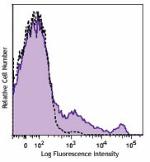
Lewis rat splenocytes were stained with CD161 (clone 3.2.3) ... -
APC anti-rat CD161
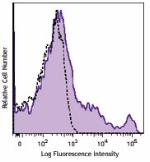
Lewis rat splenocytes were stained with CD161 (clone 3.2.3) ... -
FITC anti-rat CD161
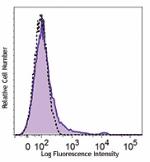
Lewis rat splenocytes were stained with CD161 (clone 3.2.3) ... -
PE/Cyanine7 anti-rat CD161
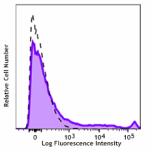
Rat splenocytes were stained with CD161 (clone 3.2.3) PE/Cya... -
PE/Cyanine5 anti-rat CD161

Rat splenocytes were stained with anti-rat CD3 PE and CD161 ...

 Login/Register
Login/Register 













Follow Us